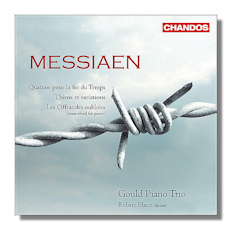
The Internet's Premier Classical Music Source
Related Links
- Messiaen Reviews
- Latest Reviews
- More Reviews
-
By Composer
-
Collections
DVD & Blu-ray
Books
Concert Reviews
Articles/Interviews
Software
Audio
Search Amazon
Recommended Links
Site News
 CD Review
CD Review
Olivier Messiaen

Chamber Music
- Quatuor pour le fin du Temps 1-4
- Thème et variations 2,4
- Les Offrandes oubliées (arr. Messiaen) 4
1 Robert Plane, clarinet
Gould Piano Trio:
2 Lucy Gould, violin
3 Alice Neary, cello
4 Benjamin Frith, piano
Chandos CHAN10480 DDD 67:40
I've yet to hear an ineffective recording of the Quartet for the End of Time. Here's another good one, played by the members of the Gould Piano Trio, joined by clarinetist Robert Plane. The Gould Piano Trio is a fairly young ensemble; in 1998 they were designated as British "Rising Stars" (by whoever designates such a thing!). They already have a respectable discography which consists of music by Mendelssohn and Stanford (for Naxos), Brahms and Fuchs (for Quartz), and Beethoven and Smetana (available from the Trio's website – gouldpianotrio.com).
The Quartet generally is regarded as one of Messiaen's earliest masterworks, but it is the most recent work on this CD. (Les Offrandes oubliées dates from 1930 and the Thème et variations from 1932.) The story behind the Quartet is almost too familiar to repeat: conscripted into the French army, Messiaen was taken prisoner by the Germans in 1940 and transported to a prison camp. During his incarceration, he created this work for three fellow prisoners – a cellist, a clarinetist, a violinist – and himself. Some of the music was new, and some was adapted from earlier works. The Quartet's first performance took place (under difficult conditions) in the prison camp itself. The work is in eight movements; in several of the movements, two or three of the instruments remain silent. Messiaen's fascinations with birdsong and with transcendental, sometimes apocalyptic, spirituality already are in place here. In his long solo ("Abîme des oiseaux" or "Abyss of the Birds"), Robert Plane plays with astonishing control and eloquence. His extreme pianissimos, for example, will have other clarinetist gasping in admiration. All four of the musicians are open not just to the score's more meditative sections (the ultra-intimate fifth and eighth movements, for example) but to its lighter, dancing qualities – as in the fourth-movement "Intermède," which sounds even more like Ravel than usual here. In sum, this is an unusually lively reading of the Quartet, and an unusually varied one, too.
Les Offrandes oubliées (The Forgotten Offerings) is an orchestral work. Messiaen prepared a version for solo piano, and this is billed (inaccurately, I think) as its première recording. Obviously the piano cannot duplicate the orchestral colors of the original. Still, the piano gives the material a moving simplicity that is appropriate for the subject, which is nothing less than divine grace and absolution from sin. Benjamin Frith (who years ago made an excellent recording of Messiaen's Visions de l'Amen with Peter Hill) shines here.
The Thème et variations was written for the composer to perform with his first wife, an accomplished violinist. This work is not played often enough, and Frith and Gould make a fine argument for it, particularly because they keep its textures airy and flowing. If you've been timid about Messiaen, this would be a good place to start. Even though I own several recordings of the Quartet, this one definitely will retain a favored place in my collection.
Copyright © 2008, Raymond Tuttle





















